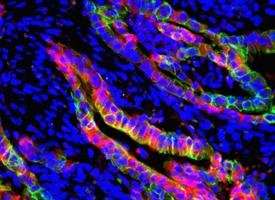Pancreatic tumors may require a one-two-three punch

One of the many difficult things about pancreatic cancer is that tumors are resistant to most treatments because of their unique density and cell composition. However, in a new Wilmot Cancer Institute study, scientists discovered that a three-drug combination can simultaneously target the cancer cells as well as the other harmful, inflammatory cells within the tumor, to improve survival.
The research builds on previous scientific data from the lab of David C. Linehan, M.D., and may define a more personalized approach to treating pancreatic cancer. Ultimately, physicians will use information from the pancreas tumor biopsy about volume and predominance of cancer cells and non-cancerous inflammatory cells that impact the immune system, and then plan the best treatment.
"People with pancreatic cancer don't have 10 years to wait for the next new drug," said Linehan, a surgical oncologist, director of clinical operations at Wilmot, and the Seymour I. Schwartz Professor and Chair of the Department of Surgery at the University of Rochester Medical Center.
"Our approach is based on evidence that this disease has particular characteristics involving both the tumor and the immune response," he said, "and we believe that treatment must address all sides of the problem."
In fact, more than 80 percent of a pancreatic tumor is comprised of cells that are not malignant cancer cells. But many of these non-cancer cells, called tumor-associated macrophages (or TAMs) still play a vital role in promoting cancer by preventing the immune system from attacking the cancer. In addition to TAMs, pancreatic tumors are also comprised of and surrounded by tumor-associated neutrophils (TANs) that further block the immune system when pancreas cancer is present. (The cancer recruits these detrimental "helper" cells, TAMs and TANs, from the bone marrow.)
Patients who have a high number of TAMs and TANs in their biopsy samples have a poorer prognosis. In general, survival odds for pancreatic cancer are dismal and the incidence is rising, fueling an urgent need for improvements in treatment through research.
The objective of the study, which was published in the British medical journal Gut, was to target TAM and TAN with a combination of experimental drugs that would reduce their numbers and allow the body's own immune defenses to act appropriately and fight the cancer, and to boost the effectiveness of standard chemotherapy. The study was conducted in mice but researchers also performed correlative analyses on human pancreatic tumor samples.
Results showed that targeting TAM and TAN—as well as the cancer cells—improved antitumor immunity and chemotherapy response better than using any single therapy.
The Gut journal also published an accompanying editorial by a German physician and research leader in pancreatic cancer, who said the Wilmot study provides a strong rationale for using combinations of drugs to overcome immune evasion in pancreatic cancer and other solid tumors.
More information: Timothy M Nywening et al. Targeting both tumour-associated CXCR2+neutrophils and CCR2+macrophages disrupts myeloid recruitment and improves chemotherapeutic responses in pancreatic ductal adenocarcinoma, Gut (2017). DOI: 10.1136/gutjnl-2017-313738
Patrick Michl et al. Overcoming immune evasion in pancreatic cancer: the combination matters, Gut (2017). DOI: 10.1136/gutjnl-2017-315443
















